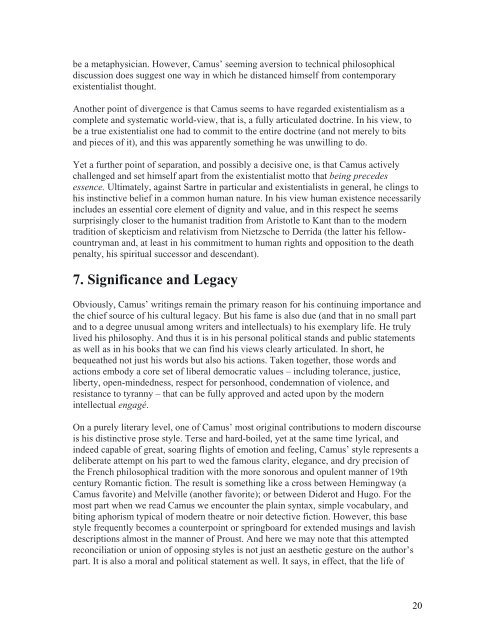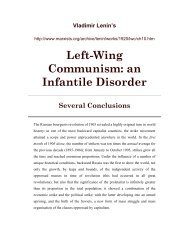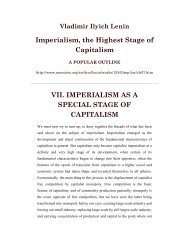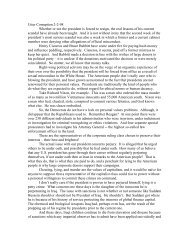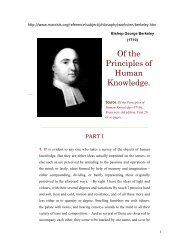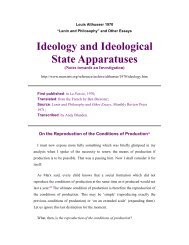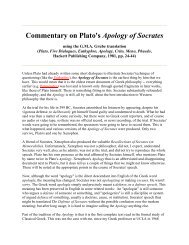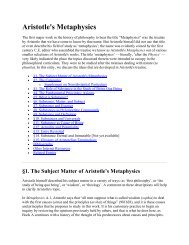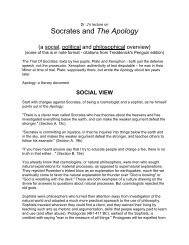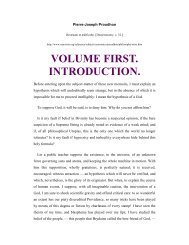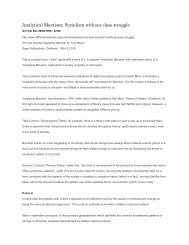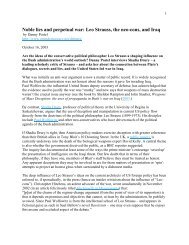Albert Camus (1913â1960) - Richard Curtis
Albert Camus (1913â1960) - Richard Curtis
Albert Camus (1913â1960) - Richard Curtis
You also want an ePaper? Increase the reach of your titles
YUMPU automatically turns print PDFs into web optimized ePapers that Google loves.
e a metaphysician. However, <strong>Camus</strong>’ seeming aversion to technical philosophical<br />
discussion does suggest one way in which he distanced himself from contemporary<br />
existentialist thought.<br />
Another point of divergence is that <strong>Camus</strong> seems to have regarded existentialism as a<br />
complete and systematic world-view, that is, a fully articulated doctrine. In his view, to<br />
be a true existentialist one had to commit to the entire doctrine (and not merely to bits<br />
and pieces of it), and this was apparently something he was unwilling to do.<br />
Yet a further point of separation, and possibly a decisive one, is that <strong>Camus</strong> actively<br />
challenged and set himself apart from the existentialist motto that being precedes<br />
essence. Ultimately, against Sartre in particular and existentialists in general, he clings to<br />
his instinctive belief in a common human nature. In his view human existence necessarily<br />
includes an essential core element of dignity and value, and in this respect he seems<br />
surprisingly closer to the humanist tradition from Aristotle to Kant than to the modern<br />
tradition of skepticism and relativism from Nietzsche to Derrida (the latter his fellowcountryman<br />
and, at least in his commitment to human rights and opposition to the death<br />
penalty, his spiritual successor and descendant).<br />
7. Significance and Legacy<br />
Obviously, <strong>Camus</strong>’ writings remain the primary reason for his continuing importance and<br />
the chief source of his cultural legacy. But his fame is also due (and that in no small part<br />
and to a degree unusual among writers and intellectuals) to his exemplary life. He truly<br />
lived his philosophy. And thus it is in his personal political stands and public statements<br />
as well as in his books that we can find his views clearly articulated. In short, he<br />
bequeathed not just his words but also his actions. Taken together, those words and<br />
actions embody a core set of liberal democratic values – including tolerance, justice,<br />
liberty, open-mindedness, respect for personhood, condemnation of violence, and<br />
resistance to tyranny – that can be fully approved and acted upon by the modern<br />
intellectual engagé.<br />
On a purely literary level, one of <strong>Camus</strong>’ most original contributions to modern discourse<br />
is his distinctive prose style. Terse and hard-boiled, yet at the same time lyrical, and<br />
indeed capable of great, soaring flights of emotion and feeling, <strong>Camus</strong>’ style represents a<br />
deliberate attempt on his part to wed the famous clarity, elegance, and dry precision of<br />
the French philosophical tradition with the more sonorous and opulent manner of 19th<br />
century Romantic fiction. The result is something like a cross between Hemingway (a<br />
<strong>Camus</strong> favorite) and Melville (another favorite); or between Diderot and Hugo. For the<br />
most part when we read <strong>Camus</strong> we encounter the plain syntax, simple vocabulary, and<br />
biting aphorism typical of modern theatre or noir detective fiction. However, this base<br />
style frequently becomes a counterpoint or springboard for extended musings and lavish<br />
descriptions almost in the manner of Proust. And here we may note that this attempted<br />
reconciliation or union of opposing styles is not just an aesthetic gesture on the author’s<br />
part. It is also a moral and political statement as well. It says, in effect, that the life of<br />
20


